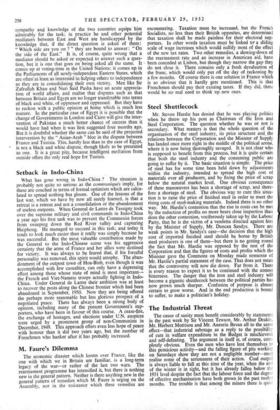Steel Shuttlecock
Mr. Steven Hardie has denied that he was playing politics when he threw up his post as Chairman of the Iron and Steel Corporation. The question whether he was or not is secondary. What matters is that the whole question of the organisation of the-steel industry, its price structure and the relations between the Corporation and the Minister of Supply has landed once more right in the middle of the political arena, where it is now being _thoroughly savaged. It is not clear who is supposed to benefit from this process, but it is quite certain that both the steel industry and the consuming public are going to suffer by it. The basic situation is simple. The price of steel has for some time been held down by adjustments within the industry, intended to spread the high cost of materials over all producers, and by fixing the price-of scrap below the natural market level. One obvious consequence of these manoeuvres has been a shortage of scrap, and there- fore a shortage of steel. The obvious way to cure this situa- tion is to raise the price of finished steel in order to meet the rising costs of steel-making materials. Indeed there is no other way. Mr. Hardie's contention that the rise in costs can be met by the reduction of profits no more bears close inspection than does the other contention, vociferously taken up by the Labour Party, that he is the victim of a vendetta directed against him by the Minister of Supply, Mr. Duncan Sandys. There are weak points in Mr. Sandys's case—the decision that the high cost of imported finished steel should be borne by British steel producers is one of them—but there is no getting round the fact that Mr. Hardie was opposed by the rest of the Corporation and that the figures v3f costs and profits which the Minister gave the Commons on Monday made nonsense of Mr. Hardie's partial statement of the case. That does not mean that the controversy will now die down. Far from it. There is every reason to expect it to be continued with the utmost bitterness. The danger that the iron and steel industry will become a gigantic shuttlecock between the political parties has now grown much sharper. Confusion of purpose is almost certain to grow worse. And in the end production is bound to suffer, to make a politician's holiday.


































 Previous page
Previous page